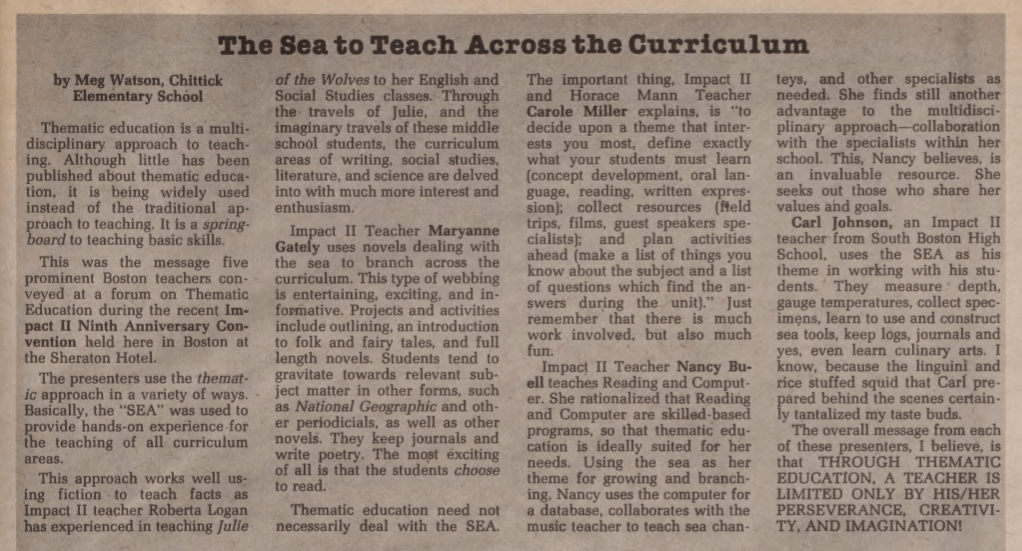A common phrase you will hear in education is, “don’t reinvent the wheel.” Many teachers believe that good teaching does not mean spending hours to create original work. Rather, they believe that educators should be taking and adding onto one another’s work. Teachers used the BTU’s newspaper to pass around the wheel by writing on new and result-based teaching pedagogies and strategies.
“Educational Cognitive Style” (1978)
At the Bowditch School
“Most recently, emphasis has been placed upon determining a child’s strongest modality for receiving data: visual, auditory, tactile-kinesthetic, or a combination of these. This approach reaches far beyond this, that of viewing the child as a unique individual.”

Teachers use this platform to share with one another new methods for the classroom. For example, This article from the Bowditch school looks at cognitive style, which focuses on individualism and the four categories of behavior. More specifically, this method looks at the different ways in which students learn and focuses on the students as individuals who may not learn through only one style of teaching. This type of teaching, commonly called the Universal Design for Learning (UDL) today, is still utilized and popular in present-day classrooms. It is fascinating to see the evolution of UDL starting as cognitive style in the late 1970s.
“Teachers must be aware of their own teaching style, for no longer can one style be used to instruct all children. Instead there must be a self-awareness and a flexibility to adapt this style to the needs of the learner.”
“Community and the Classroom” by Donna Santosuosso (1973)
Another particularly powerful article looks at how the community can be utilized for the classroom. In this article, Donna Santosuosso, from the Baker School, looks at how one can bring in the various opinions and viewpoints of the community of a school to address problems, particularly those with racial overtones. This way, the students, parents, and staff of the school can learn about and come to a better understanding on an issue. Santosuosso found this to be especially effective when dealing with a city that is shifting rapidly due to changes in the population. These human connections, she explains, can be made through workshops.

“By sharing views and information people could better understand the problems and could work together more effectively toward the solution of these problems.”
“The Sea to Teach Across the Curriculum” by Meg Watson (1987)
“This type of webbing is entertaining, exciting, and informative.”

This article dives into the teaching style of thematic education. For this method, teachers utilize different curriculum areas, unlike the traditional way of educating in which a teacher will only focus on one curriculum area (a math teacher might only teach math, for example). Thematic education incorporates writing, reading, social studies, and computer science into one project. This allows teachers to build basic skills while making the content more engaging for students. This technique has proven to still be beneficial even today.
“The overall message from each of these presenters, I believe, is that THROUGH THEMATIC EDUCATION, A TEACHER IS LIMITED ONLY BY HIS/HER PERSEVERANCE, CREATIVITY, AND IMAGINATION!”
Teachers on Teaching Today
The Boston Teachers Union continues to celebrate the work that teachers do through the podcast The Teachers on Teaching Podcast. This podcast, created by the Director of Professional Learning, Paul Tritter, highlights the pedagogies teachers use in classrooms today. Explore The Teachers on Teaching Podcast to find out how the BTU is continuing to feature teachers voices!
For more articles from the BTU’s newspaper on teaching strategies, please see the following:
- “Helping Parents Develop Positive Strategies,” by John LoConte (2001)
- “Fast Track Presentation Skills,” by Nancy Jones (2004)
- “Positive Behavior Support Makes a Difference for Kids…,” by Betsy Drinan (2007)
